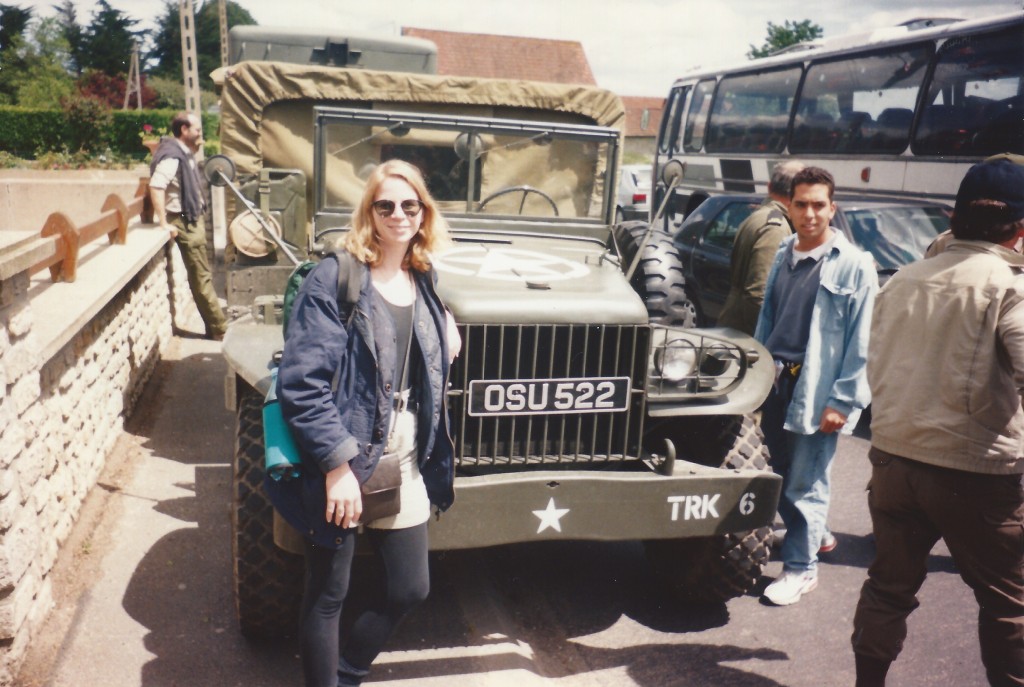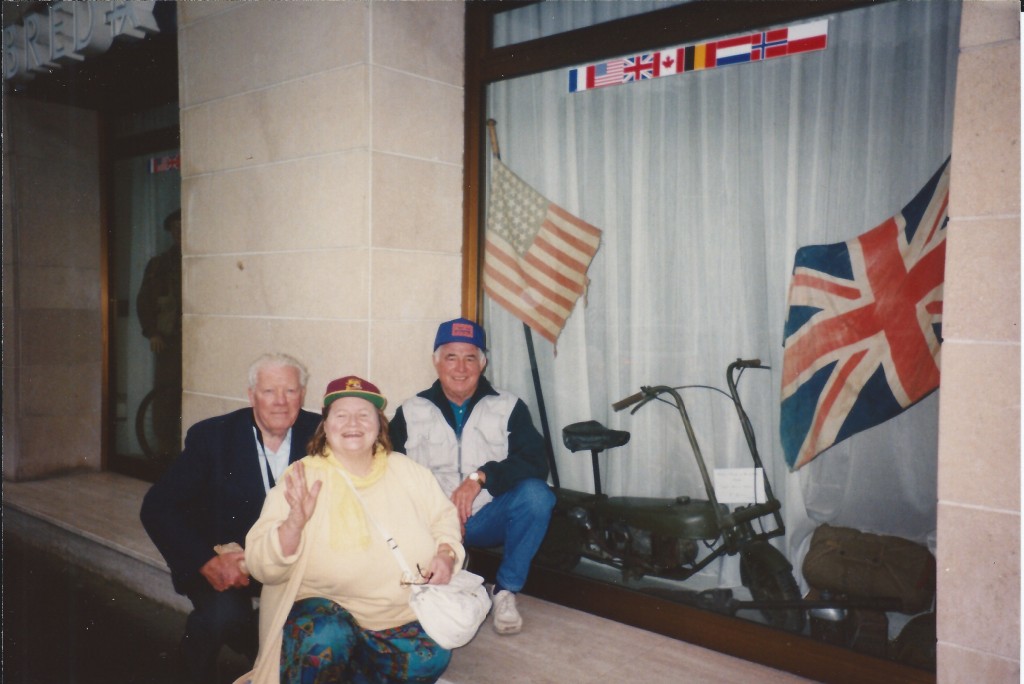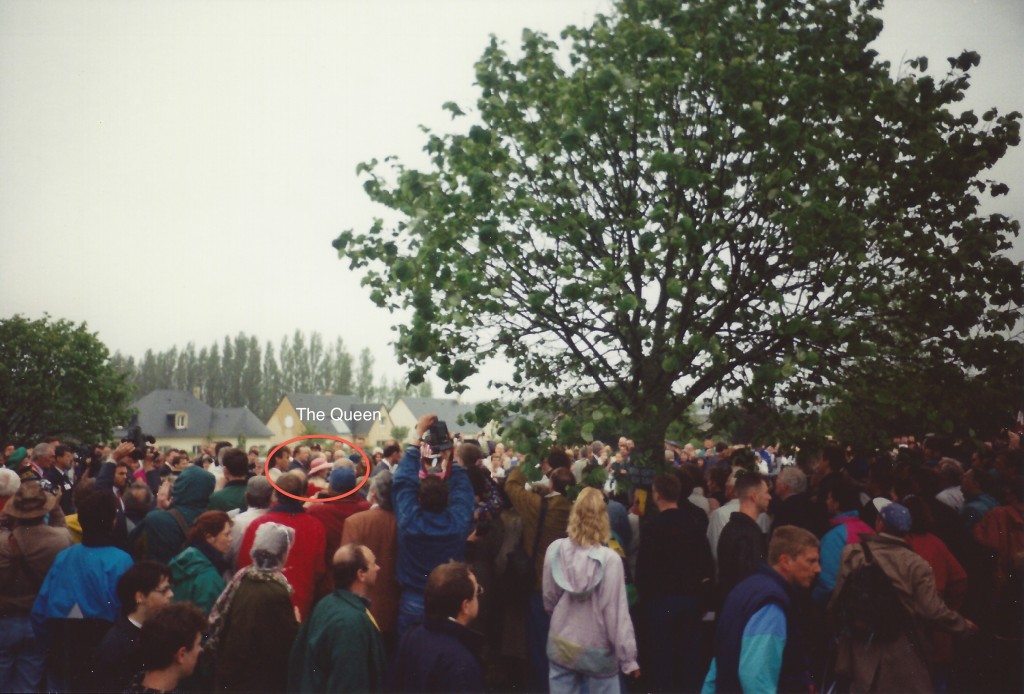It’s June 6, 2014. Seventy years since the D-Day invasion. Twenty years ago today I was a young backpacker in Bayeux, France for the fifty year anniversary of D-Day. I didn’t intend to be there. I had been visiting Normandy the day before. My friend Larry and I hitched a ride in a surplus Army jeep with some Brits who were impersonating 1940’s American soldiers. They figured out that the French police who were restricting access to the ceremonies and events might think they were official representatives if they dressed the part. Of course, then they picked up a bunch of backpackers hitching rides. When we came to barricades and guards the Brits would shout back at us to get down and we’d close the tarps so they couldn’t see us in the back of the jeep. We went to a field near Sainte Mere Église with them to watch the parachute drop. I think there was one crazy old paratrooper who wanted to jump this year. but in ‘94 there were a whole bunch of them who wanted to show off that they could still jump out of perfectly good airplanes onto the French countryside. Heck, nobody would even be shooting at them this time. Piece of cake. As we drove along, French people stood along the roads waving small American and British flags. The town of Sainte Mere Église was the first to be liberated by the Allies on the night of June 5th. It was a mob scene, but a happy mob scene. It was great. The French liked us. We felt patriotic. None of the old paratroopers died that day…as far as we could tell, anyway.

But then we returned to Paris. Larry went on his way and I found myself in the Paris train station late on a Sunday night with no idea where to go. I decided to take the train to Cherbourg because it was about a four hour trip. Four hours there, four hours back. I could sleep on the train and figure out what to do with myself when it was morning. But that’s not how it worked out.
The train from Paris to Cherbourg at midnight was pretty empty. What kind of fool would want to roll into town at 4 o’clock in the morning? And everyone who needed to be in Normandy for the celebrations was already there. I found a row of seats to myself and commenced settling my backpack and taking my contacts out. Apparently the American contact solution attracted attention. Pretty soon the older gentleman in the next seat started up a conversation with me. “Do you know anything about Bayeux? Are you going to the beaches? Do you speak French? Because I really have no idea how I’m going to get around but I really want to be part of the D-Day celebrations. I was too young at D-Day. I joined up later and served in the Army at the very end of the war and during the mopping up phase.” He handed me his card, “George Earl Pottinger.” “Call me Earl.” Got it.
I told him I spoke a little French and I was willing to help him out as much as I could. Bayeux was a couple of stops before Cherbourg. I knew from my visit the day before that there would be mobs of people and hotels would be hard to come by, but I told him to let me get a couple of hours of sleep and I’d show him around as much as possible. Now this conversation caused another older gentleman on the train to perk up his ears. “Did you say you speak French? And you know something about Normandy? I was on the beaches in 1944. I was in the Navy. They sent me an invitation to be at the ceremonies but I didn’t think I’d be able to make it so I never sent the forms back. I decided to come anyway at the last minute and now I’m not sure what I’m going to do or how I’m going to get around. My name’s Don Sullivan.” I sent Don to sit next to Earl and told them both to wake me up when we got to Bayeux. The whole idea of my being a tour guide in a country I knew almost nothing about was pretty funny. But I did speak some French and I figured I could at least help them to read signs or negotiate for a hotel or something…
They woke me up as the train was pulling in to the station. It was about 4:30. That’s a.m. This is not a time of day I usually see unless I haven’t gone to bed yet. We got ourselves off the train where we picked up another traveler, Bridget, a middle-aged Englishwoman currently living in New Zealand. She also spoke some French, so we had two veterans and two women who spoke a little French. And no plan. The walk from the train station showed me we had a problem already. It was still half dark outside. The only evidence of people was the smell of baking bread from a local bakery. But they weren’t open yet. We could all see that Don was not going to be able to lug his suitcase around for long. While Earl seemed very hale, Don looked tired. I had a big pack on my back and wasn’t thrilled with carrying it all day either. We found a bench for Don to sit down while the rest of us looked for a hotel that might be kind enough to let us store our luggage for a few hours. We saw a nice one near the middle of town and peeked in the door. It was still too early for most people to be about but we ran into a television crew from NBC. They were busy and rushing to get out to the beaches and set up for President Clinton’s speech. We asked if they knew where the proprietor was and they told us it would probably be okay to leave our bags in the kitchen area downstairs with a note. Totally safe, right?
Now I have to digress for a moment. You see, the man who was obviously the news anchor told us this and, well, he was the most handsome man I have ever met in person. With the most mellifluous voice. And he seemed really nice. So I’m pretty sure I would have done anything he suggested. I didn’t know who he was at the time, but I learned about a year later when I was watching the news at my parents’ house. Brian Williams. I still think he might be the handsomest man who has ever read the news. Anyway, my whole interaction with him lasted for about one minute, maybe less. Sigh. The NBC folks got into their vehicle and rushed off, while we tried to make enough noise at the hotel so that we might attract someone who would tell us it was actually okay to leave all of our earthly possessions in their kitchen. Didn’t happen. We left our stuff with a note that said the NBC guys told us it would be okay and hoped for the best.

Finally it was time to eat breakfast. We found a café where we met an older Welshman, his son, and son-in-law, who were headed out to the beaches for the celebrations. The two D-Day veterans, Don and the Welshman, swapped stories. I learned that Don had been in the Navy on a landing craft that was supposed to unload tanks to the beaches. But one of the tanks was still chained to the landing craft and took the ramp off with it when it was unloaded. That Navy crew was stranded on the beach for days before they were finally picked up.
When the Welshman left for the ceremony at the beaches we wandered around Bayeux. The town was crowded with people. We followed a crowd near the British cemetery and got to see the Queen walk by with her escort. I took a picture of her pink hat through the crowd. She gave a speech. I took another picture of her hat and white glove as she got into her helicopter and flew away. We walked around meeting people and seeing things. It was cool. The French really seemed to like us that week. No one had had any sleep but it was a good day. We found the tourist bureau and got lucky to find a hotel for Earl and Don. They were determined to visit the beaches even if they didn’t get to see President Clinton talk there. The beaches and the monuments and the cemeteries would still be there after the government officials were gone. Bridget already had a place to stay in town and a plan for the rest of her visit. In the late afternoon we gathered up our luggage, which had been kept very nicely for us and took Earl and Don to their hotel. I hugged and kissed everyone and the nice hotel proprietor took me in his car to the train station where I went on my way to Paris and then to Nice for more backpacking adventures.

Because of the crowds that day I didn’t get to properly see Bayeux. I returned a couple of months later to visit the D-Day museum, the cemeteries, and, of course, the famous tapestry. On my second visit to Bayeux I met a Dutchman who was walking the route the Allied soldiers took until they freed his town in the Netherlands. The Europeans really liked us that summer.
But I learned one more D-Day story after I returned home. Earl sent me a letter to let me know what happened the next day, June 7, 1994. They did make it out to the beaches that day but Don was tired after days of walking and went off to bed early. Earl sat in a nearby pub. He’s a friendly guy and he started chatting up another man at the bar. The man told Earl that he was in Normandy with his father. The father had been in the Navy on a landing craft. When the craft reached the beach, one of the tanks ripped the ramp off. Earl said he had a friend with the same story. The son called his father over and they repeated the story. They had to go back to the hotel and wake Don. Turns out they were both on the same landing craft, out of the thousands of ships that made the invasion. The two men had not seen each other for fifty years but they had quite a reunion that night.
It’s a great story now. Earl and Don met and became friends. Don met up with an old buddy. It’s heartwarming. But remember the young navy men who were stranded on that beach after their landing craft went down. They watched hell unfold and hoped to heaven there was some rescue for them. Hoped that they wouldn’t be laying on the beach or floating in the water like so many others around them. D-Day was the first step to the Allied victory, but they didn’t know how it would turn out then. Most of the men who fought that day are gone now. Don passed away in 1997. Even the youngest World War II veterans are almost 90 years old now. It’s a long time ago. But it’s worth taking some time to remember them today.
286 thoughts on “Remembering D-Day”
Comments are closed.